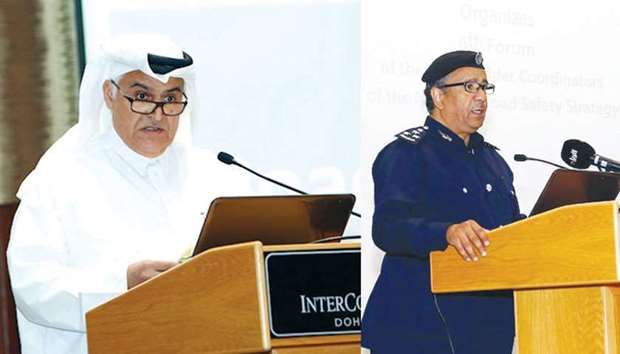General Directorate of Traffic’s director general and second vice president of the National Traffic Safety Committee (NTSC) Brigadier Mohamed Saad al-Kharji has called for taking extra efforts for the success of the second phase of the National Strategy for Traffic Safety (2018-2022).
He was delivering the keynote address at the sixth Forum of the Stakeholder Co-ordinators of the National Road Safety Strategy recently. Titled ‘Accomplishment of Goals’, the event was held within the framework of the second phase of the implementation of the National Strategy for Traffic Safety (2018-2022).
Brig al-Kharji said the forum coincided with the completion of five important years in the implementation of the first phase of the National Strategy for Traffic Safety.
He said the implementation of the second phase of the strategy required extraordinary efforts, co-operation from all stakeholders and unparalleled implementation mechanisms to address traffic problems and the achievement of the 2022 goals with high efficiency.
The senior traffic official said the first phase of the implementation of the strategy (2013-2017) achieved remarkable results, which resulted in a decrease in the mortality rate in 2017 to 177 cases, an average of 6.6 cases per 100,000 people.
This indicated the high level of progress achieved by Qatar in reducing fatal road accidents.
Brigadier al-Kharji said during the second phase, the authorities aim to reduce the number of traffic accidents to 130 annually by 2022 and also bring down e the number of serious injuries to 400 by 2022.
The second phase also aims at the implementation of the United Nations goals for sustainable development related to reducing congestion, developing urban planning, road and transport networks, improving traffic safety, and linking improved traffic safety with economic growth, national security and population policy.
The National Traffic Safety Committee secretary-general Brigadier Mohamed Abdullah al-Malki said the objective is to put Qatar at the forefront of the region’s most advanced countries in the field of roads, transport and traffic safety by building an integrated transport system in accordance with national strategic vision.
The system included the formulation of policies and plans and work on developing them, evaluating traffic problems and proposing methods of treatment, providing theoretical and technical consultation to the competent authorities, in addition to following up the progress of the achievement and strengthening co-ordination among the various stakeholders.
Ashghal’s Highways Department director and senior engineer Yousef al-Emadi, who represented president Dr Saad bin Ahmed al-Mohannadi, said the authority had started a new era in the implementation of its projects and achieving their goals and objectives in line with the Qatar National Vision 2030. He hoped their efforts would eventually contribute to the highest safety rates on the country’s road networks.
Ashghal, he said, is aiming to enhance the objectives of the National Traffic Safety Committee and the National Traffic Safety Office by providing extensive logistical support and implementing the plans entrusted to it.
The senior Ashghal official added the authority is striving hard to implement several projects listed in the plan and has been able to complete several massive projects to achieve road safety in the last two years.
Al-Emadi said the Road Maintenance Department also completed 36 projects between and 2014 - 2017 and included 371 bicycle tracks. “In the next five years we hope to complete a number of projects including 1,543km of road works and 2,000km of footpaths in addition to 1,028km of bicycle tracks,” he said.
During the five-year plan 2018-2022 (including both the years), the authority is working on a total of 25 plans for road safety and their follow-up. They included those related to safety of work sites, traffic congestion management, intelligent transportation system and road safety including the rushing of the emergency teams to respond to the urgent maintenance, ensuring the safety of pedestrians and management of traffic congestion during the FIFA 2022 World Cup.
The Public Health Department director and National Traffic Safety Committee member Dr Sheikh Mohamed bin Hamad al-Thani said despite the rapid population growth in Qatar, emergency services and emergency medical response have witnessed a major development.
“We aim to provide the best services, such as flying ambulance and high-quality 24/7 emergency care services and reducing the incidence of disabilities due to accidents via Qatar Rehabilitation Center, which is the largest specialised hospital of its kind in the region,” he added.
Ministry of Transport and Communications’ Land Transport Affairs assistant undersecretary Rashed Taleb al-Nabit said work has started to link between different means of transportation to serve the end users, ease transportation and reduce congestion and pressure on road networks.
The National Road Safety Office manager Professor Kim Jraiw emphasised the importance of co-operation between government institutions, the private sector, civil society organisations and all sectors of the society in order to make sustainable and unprecedented efforts to move away from traditional operational practices and adopt effective initiatives to achieve the desired goals.

Brigadier Mohamed Abdullah al-Malki addressing the forum. Right: Brigadier Mohamed Saad bin al-Kharji speaking at the meeting.
